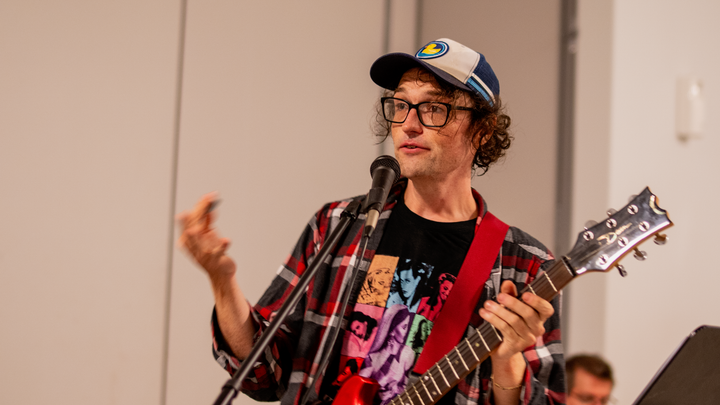STAPLE! Returns After Five-Year Hiatus

Texas’s premiere gathering of indie comic and tabletop creators, STAPLE!, is returning to Austin after a five-year hiatus brought on by the pandemic. It will be open April 13 and 14 at the Malbee Ballroom of St. Edward’s University. Tickets and more information can be found at their official website.
Since 2005, STAPLE! has been the place where indie and underground comic creators have gathered in Texas. As the mainstream comic industry becomes more of a pipeline to Hollywood success, events like STAPLE! are important in helping independent creators make connections and share trade secrets to survive in the current environment.
“The whole purpose all along has been to connect creators to an audience,” says Chris ‘Uncle Staple’ Nicholas, the founder of the event. “With comics and games, distribution is really hard to do without shows like this. The internet has opened a lot of avenues, but it’s made the bar of entry so much lower. Helping people make that personal connection is so important.”
One of those people is Chesca Hause, the creator of the web comic Litterbox. She is a guest of honor this year and was even given the task of designing the “staple gator” logo for the triumphant return.
When she moved to Austin from Britain in 2014, she was already an artist but not yet a comic creator. She attended STAPLE! and immediately found a welcoming community that helped her launch her own now-popular series.
“STAPLE! was my first ever comic con,” she says. “I was shy and scared to talk to people. Everyone doing these comics just seemed so cool.”
Litterbox is a hilarious parenting comic starring anthropomorphic cats dealing with rambunctious kids. It grew out of Hause’s previous company that would “cartoonize” pets, and has continuously grown in popularity. She will be part of a roundtable discussion of the art form that also includes Mattie Lubchansky and fellow Texan Thestarfishface. Hause finds it weird to have ascended to the level of wise elder.
“The older you get, the more you realize that no one knows what they’re doing,” she says. “When I got to cons and on the visitor side, I’m so shy and awkward. I love being behind the table, and I am so happy to chat with people.”
Nicholas started STAPLE! in 2005, and it quickly grew to a major event that drew artists, writers, zine makers, and everyone else outside the mainstream. Shows continued unbroken until 2019. The expense of hosting the events started to become too much for Nicholas, and then the world ended with a plague.
Even once the pandemic subsided, Nichloas found re-launching STAPLE! difficult. Prices for venues had gone up, and because the show focused on lesser-known talent it was hard to make ends meet without big names to draw crowds. Salvation came from Jeremy Johnson, assistant professor of video game development at St. Edward’s University.
“He reached out, said he was a fam, and they had some space,” says Nicholas. The venue was booked, but even Nicholas underestimated how much people had missed STAPLE!. Their entire stock of vendor tables was sold within 18 hours of announcing.
The event will consist of seven hours of programming over two days, as well as over 100 showcasing artists and vendors. While it’s a comic convention in the strictest sense of the word, because it’s focused on indie and underground works, there is a lot less pop culture detritus. Nearly everyone attending will be showcasing a personal passion project, often self-published.
Panels will focus on webcomic creation, marketing, game design, publication, the use of zines and comics in education, career management, and animation. If someone wanted to see what it was like to create your own comic or tabletop game, there is no better venue in all of Texas.
The need for STAPLE! has only grown since 2019. Increasingly, independent comic creators like Milton Lawson and Paul Hanley are forced to go unconventional routes to release their books. With the big companies all chasing the big superhero payouts, collaboration and cooperation on other types of comics becomes a matter of survival.
“It’s a terrifying time, obviously, but it’s also exciting,” says Nicholas. “There’s a ton of great new creators coming up, and a lot of opportunities. There’s a lot more interest. The pandemic was horrible, but some good came out of it in that people were glued to the internet. So, they were exposed to a variety of things they might not have been otherwise. Man, I spent so m much money on Kickstarter over the pandemic. I’ve always felt like comics in the popular consciousness are superheroes, but it’s a storytelling medium. You can tell any sort of story you can imagine. It’s a great time, and you will be entertained, inspired, and educated.”



Comments ()